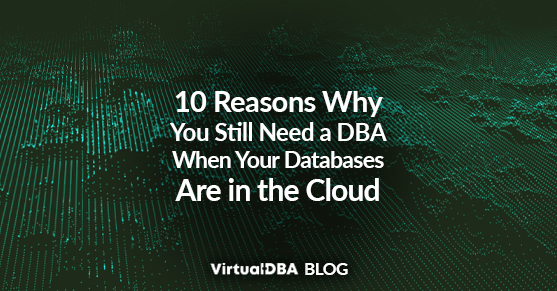In the era of cloud computing, the role of Database Administrator (DBA) might seem like a relic of the past. After all, many organizations believe that the need for dedicated DBAs has diminished with the migration of databases to the cloud. However, contrary to popular belief, the expertise of a skilled DBA remains invaluable, even in a cloud-based environment. Here are ten compelling reasons why you still need a DBA when your databases are in the cloud:
1. Performance Optimization: Despite the scalability and flexibility offered by cloud databases, performance issues can still arise. A DBA can fine-tune queries, optimize database schemas, and configure indexing to ensure optimal performance, maximizing the efficiency of your cloud resources. Databases in the cloud can scale horizontally or vertically based on workload fluctuations. DBAs must adapt to these changes and configure alerts to ensure optimal performance and resource utilization.
2. Security Management: Data security is paramount, especially in the cloud, where sensitive information is stored remotely. A DBA can implement robust security measures, such as encryption, access controls, and regular audits, to safeguard your data against cyber threats and compliance breaches. Cloud platforms host multiple tenants (organizations or users) on shared infrastructure. DBAs must ensure proper isolation between databases to prevent data leakage or unauthorized access. Alert management helps detect anomalies and give early warning for possible security breaches.
3. Cost Optimization: Cloud databases operate on a pay-as-you-go model, leading to unpredictable costs if not managed efficiently. Cloud costs are directly tied to resource consumption (CPU, memory, storage, etc.). DBAs monitor performance metrics and adjust resource allocation based on workload patterns. Effective alert management helps optimize costs by identifying inefficient queries, resource bottlenecks, or underutilized instances. A DBA can analyze usage patterns, identify resource bottlenecks, and recommend cost-saving strategies, helping you optimize your cloud expenditure without sacrificing performance.
4. Data Governance: Maintaining data integrity, consistency, and compliance is essential, particularly in regulated industries. A DBA can establish and enforce data governance policies, ensuring that data quality standards are upheld and regulatory requirements are met, even in a cloud environment. DBAs monitor security-related alerts (e.g., failed logins and suspicious activity) and enforce access controls.
5. Disaster Recovery: While cloud providers offer robust backup and recovery solutions, a DBA can design and implement comprehensive disaster recovery plans tailored to your business needs. This includes defining recovery point objectives (RPOs) and recovery time objectives (RTOs) to minimize downtime and data loss in a disaster. DBAs track metrics related to SLAs (e.g., uptime percentage, response time) and address any deviations. DBAs set alerts to monitor replication lag, latency, and failover events. Rapid response to alerts helps maintain data consistency and availability and ensures adherence to SLAs.
6. Database Migration and Integration: Migrating databases to the cloud or integrating with other cloud services can be complex tasks that require specialized expertise. A DBA can facilitate seamless migration and integration processes, ensuring minimal disruption to your operations and data consistency across environments.
7. Performance Monitoring and Tuning: Continuous database performance monitoring is essential for proactively identifying and addressing issues. A DBA can leverage monitoring tools and performance metrics to detect anomalies, troubleshoot bottlenecks, and implement optimizations, keeping your cloud databases running smoothly.
8. Capacity Planning: Scaling resources in the cloud is easy, but knowing when and how to scale requires careful planning. A DBA can forecast future capacity requirements based on growth projections, workload patterns, and performance metrics, allowing you to scale your cloud databases efficiently and cost-effectively. DBAs configure alerts to trigger auto-scaling actions (e.g., adding read replicas, increasing storage capacity) when thresholds are exceeded. This ensures seamless performance during traffic spikes.
9. Customization and Automation: While cloud platforms offer a wide range of features and services, they may only sometimes meet the unique needs of every organization. A DBA can develop custom scripts, automate routine tasks, and integrate third-party tools to enhance the functionality and performance of your cloud databases.
10. Expertise and Experience: Ultimately, the knowledge and experience of a seasoned DBA are irreplaceable. DBAs in cloud environments play a pivotal role in maintaining database health, security, and performance, from troubleshooting complex issues to providing strategic guidance on database architecture and technology trends. Their expertise in alert management ensures that organizations can harness the benefits of the cloud while mitigating risks effectively.
In conclusion, while the advent of cloud computing has transformed the way databases are managed and deployed, the role of the DBA remains as critical as ever. By leveraging their expertise in performance optimization, security management, cost optimization, and more, DBAs play a vital role in maximizing the value and efficiency of your cloud databases. Investing in skilled DBAs is not just a choice; it’s a strategic imperative for organizations looking to harness the full potential of cloud technology while safeguarding their most valuable asset: data.
Check out our on-demand services for cloud DBAs.
If you have any questions, please contact us.

